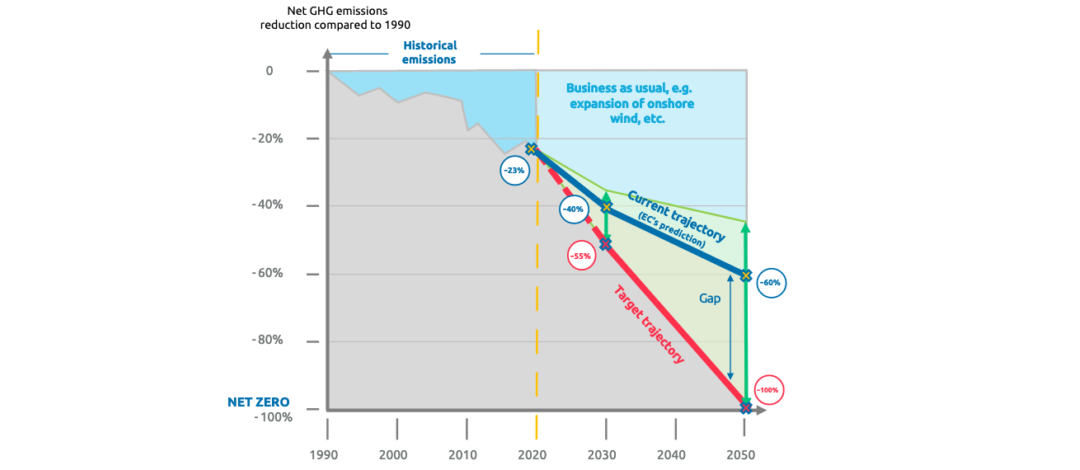Taking responsibility, driving renewal
By signing the Paris Climate Agreement in 2015, the global community agreed to make efforts to limit anthropogenic warming of the global average temperature to 1.5°C. To meet this global challenge, the European Union has set itself the goals of becoming climate neutral by 2050 and, achieving a reduction of greenhouse gas emissions of at least 55 per cent within the EU by 2030.
In the process of implementing these goals, Germany will phase out both nuclear and coal-fired power as alongside executing a wide range of other measures to counter the consequences of climate change for our society and future generations. At the same time, the consistent orientation towards climate neutrality offers the potential for sustainable growth and thus for preserving our well-being, social cohesion and the environment.
The necessary course must be set now. Our goal is to achieve the German and European climate targets efficiently, reliably and in a socially just and equitable manner. To achieve this, the implementation strategy for climate neutrality must be designed more consistently, coherently and transparently than in the past and must be put into action quickly. In accordance with the recommendations of the Leopoldina, it should follow three guidelines:
- The binding targets agreed at European level on the basis of the Paris Climate Agreement must be effectively achieved.
- This must be done in a socially balanced way and not at the expense of individual groups or regions.
- For this purpose, those instruments should be selected that entail the lowest possible economic costs.
 Image: Capgemini 2020 S.6
Image: Capgemini 2020 S.6
Triggering a surge in innovation and investment
Innovation will play a decisive role in achieving climate neutrality and enabling sustainable growth. Across all sectors, the process of decarbonisation requires technological leaps that must be driven forward with greater vigour. This will also enable us to strengthen our competitiveness in the global markets for climate-friendly technologies in the future.
Germany and Europe must use their advantageous positions to become world market leaders in climate protection technologies. The opportunities are enormous: according to a Capgemini study, a consistent focus on climate innovation would generate €802 billion in additional gross value added in Europe and 11.6 million additional jobs. At the same time, the International Energy Agency has calculated that ”almost half of all the additional emissions reductions in 2050 relative to current policy plans would be from technologies that have not yet reached the market today.” The current pace of innovation therefore urgently needs to be increased by shortening and accelerating innovation cycles, especially in the areas of research and development, as well as the demonstration and scaling up of these technologies in the market.
It must be the goal of far-sighted politics to immediately create reliable and technologically open framework conditions that consistently promote climate-friendly innovations. The underlying guiding principle should be: climate-friendly economic activity and behaviour should be economically viable.
In the spirit of a social and ecological market economy, we must give the path to climate neutrality a binding framework. For the necessary massive acceleration of climate innovations, we need an overall concept that is open to sustainable technologies and consists of market-based instruments such as emissions trading, support measures, regulation and a reform of taxes, levies, charges and fees that are CO2-oriented. Ideally, a global or at least European CO2 price for all sectors is of crucial importance. The revenues generated from this must in turn be used to support the transformation process.
This leads to central questions that we must answer urgently, with socially sustainable concepts:
- How can an effective CO2 certificate trade for all sectors and a climate protection-consistent reform of the tax and levy system be designed and implemented?
- What steps are needed for a cross-border CO2 price signal from the EU with other states such as the USA, Australia, China and Japan to strive towards a global CO2 price that complies with trade law?
- How do we achieve effective international climate protection and prevent emissions from merely being shifted to other states and regions?
- What instruments and incentives do we need for a competitive, accelerated expansion of renewable energies and the strengthening of the integration of different sectors in the energy industry (sector coupling)?
- How can we shorten innovation cycles, create a market framework for climate-neutral gases, especially hydrogen, and build and develop the necessary infrastructure for this?
- How can the application of digitalisation be used to promote the goal of climate protection, and make our energy systems and markets more transparent, efficient, and innovative?
EPICO KlimaInnovation is taking on the task of providing policy-makers with solutions to these and other issues and contributing to their implementation.
